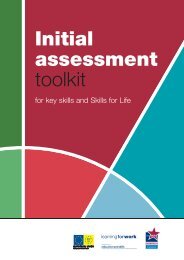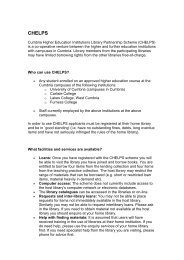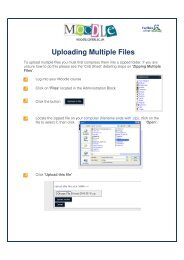Essay Writing
Essay Writing
Essay Writing
Create successful ePaper yourself
Turn your PDF publications into a flip-book with our unique Google optimized e-Paper software.
<strong>Essay</strong> <strong>Writing</strong><br />
During your time at college you will probably have to write a<br />
number of essays. Although there is no one correct way to<br />
write an essay, the following guidelines may help.<br />
Before you develop your own method of writing essays try these 7<br />
guidelines:<br />
1 Clarify the task<br />
• Be sure you<br />
know what you<br />
are looking for.<br />
• Know exactly<br />
what is<br />
required<br />
• Brainstorm or<br />
make notes to<br />
record what<br />
you know<br />
2 Collect information<br />
• Get the information you need but be<br />
focused and selective.<br />
• Write a set of questions to guide your<br />
research<br />
• Check the word limit so you know how<br />
much information you need<br />
• Decide where you will look for the<br />
information<br />
3 Organise and plan<br />
• Organise your work<br />
as you go along<br />
• Make a rough outline<br />
plan early on<br />
• Keep checking what<br />
you are doing<br />
5 Write outline plan and first draft<br />
• Work out an order of points<br />
• How many words can you<br />
use for each point?<br />
• Write a first draft<br />
• Just write it – don’t worry<br />
about style and use simple<br />
short sentences<br />
4 Reflect and evaluate<br />
• When you have<br />
gathered the<br />
information think<br />
about what you have<br />
got<br />
• What have you<br />
discovered?<br />
• Have you clarified<br />
your argument?<br />
• What evidence do you<br />
have to support your<br />
views?
6 Work on you first draft<br />
• Develop your first draft – you<br />
might produce several times<br />
but improving it each time<br />
• Make sure your arguments are<br />
clear<br />
• Check you have included<br />
evidence<br />
• Write out references<br />
7 Final draft<br />
• Fine tune it<br />
• Read it aloud<br />
• Redraft until you are happy<br />
Structuring your essay<br />
1. Title/Question<br />
• Your essay must focus on the title/question<br />
2. Introduction<br />
• Comment on the subject of the essay<br />
• Identify issues you are going to explore<br />
• Give a brief outline of the overall theme, highlighting the main points<br />
you are going to make<br />
3. Main body<br />
• This covers what you said in the introduction<br />
• Introduce the main idea(s) of the essay<br />
• Develop the main ideas of the essay<br />
• Support each idea with relevant examples and evidence etc<br />
• As the essay develops make it clear how the ideas relate to each other<br />
• This section should be about 80% of the overall word total<br />
4. Conclusion<br />
• Summarise the main ideas<br />
• State your general conclusions<br />
• Make it clear why those conclusions are important<br />
• In your last sentence sum up your argument linking it to the<br />
title/question<br />
5. Bibliography/References<br />
• List all books and articles you used within the essay
General essay guidelines<br />
• Write on one side only<br />
• Put your name on each page<br />
• Number the pages<br />
• Leave space between lines so you tutor can add comments<br />
• Use a good dictionary<br />
• Make sure your spelling and punctuation is accurate<br />
• Use a clear and simple font<br />
• Support you points with appropriate references. Do not copy material<br />
without acknowledgement - If you do you may be guilty of plagiarism.<br />
• Have supporting evidence when making assertions<br />
• When making generalisation give specific examples





